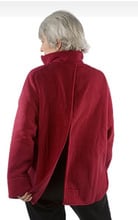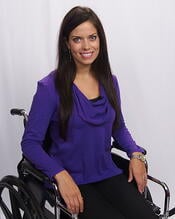For many seniors and individuals with temporary or permanent disabilities, dressing can be a significant challenge. They may struggle with handling buttons and zippers or lack the full range of motion required for self-dressing. Even when a caregiver is available, many prefer to maintain independence and perform dressing tasks as long as possible.

Is there any way to make dressing easier for people? Yes. There is adaptive clothing now available that is designed specifically for people with physical disabilities.
How does adaptive clothing work?
Adaptive clothing addresses the most common problems of people whose independent dressing skills are impacted by aging or illness such as Arthritis, Alzheimer's Disease, Multiple Sclerosis (MS), Parkinson’s Disease, and Stroke.
No more buttons!

Instead of buttons, designers use elastic waists and velcro closures instead of buttons to make it easier to put on and remove clothing. They also make closures more accessible by putting them on the front or the side of the item.
Easy to dress when you are seated

Clothing can be slipped on and fastened from the front, back, or side. This makes it easier to dress if you are seated, lying down, or can’t lift your arms or legs.
Adapted for wheelchair use

Individuals with limited mobility will be more comfortable using clothing adapted for wheelchair use. Sleeves can be adjusted for sitting and movement by the user.
The shirt's design is shorter at the back and reaches just to a seat. On a jacket, it should be cut shorter at the front and sloped down at the sides to the back.
Where is adaptive clothing available?
Unfortunately, only a few local retail stores offer a selection of adaptive clothing. Below are a few links to several online stores that sell adaptive clothing.
Silvert’s
Canadian Silvert’s is the biggest and oldest online store for senior care disability apparel. They have a vast selection of adaptive clothing and shoes, including accessories and plus-size clothing. You can find clothes explicitly designed for specific individual needs. The clothes are designed for comfort rather than fashion.
Professional Fit Clothing
Besides adaptive apparel, this California-based company offers incontinence products, wheelchair products, and clothing protectors.
Buck and Buck
Buck and Buck is a US-based company that offers a wide selection of adaptive clothing, shoes, and accessories.
MagnaReady

This small company was established by fashion designer Maura Horton whose husband has Parkinson’s. She designs dress shirts for men and women with limited mobility whose fingers aren’t nimble enough to unbutton the shirt. She fashionably solved this problem using magnets instead of buttons. The magnets are strong enough to keep a garment attached but weak sufficient to remove it quickly. Her shirts have been a great success since they hit the market.
Ezra Home Care caregivers always try to find the best way to make your loved ones comfortable while keeping their dignity at the same time. You can call us for a free needs assessment.








 Tweet
Tweet
 Share
Share



